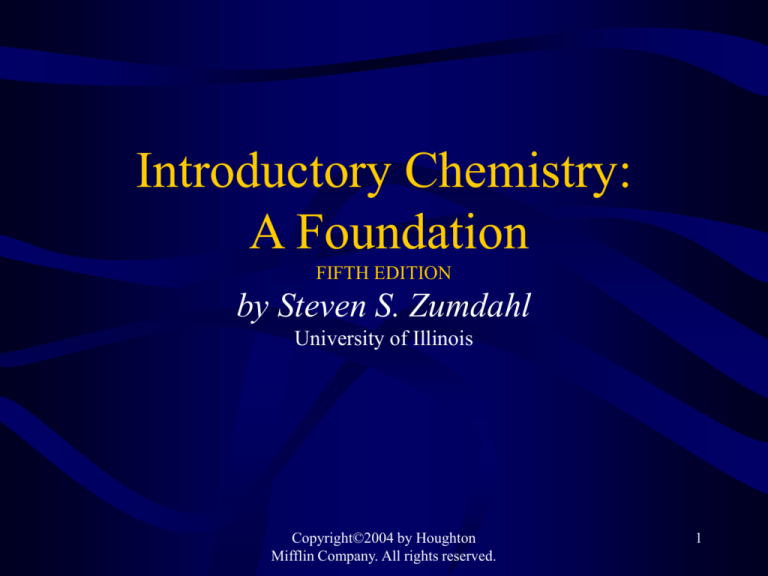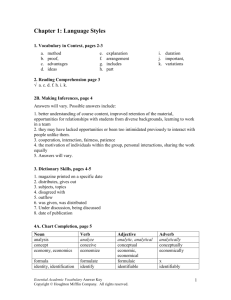
Introductory Chemistry:
A Foundation
FIFTH EDITION
by Steven S. Zumdahl
University of Illinois
Copyright©2004 by Houghton
Mifflin Company. All rights reserved.
1
Chemistry: An Introduction
Chapter 1
Copyright©2004 by Houghton
Mifflin Company. All rights reserved.
2
Why is Chemistry Important?
• In Our Daily Lives
–
–
–
–
–
New Materials
New Pharmaceuticals
New Energy Sources
Food Supplies
Can you think of others?
Copyright©2004 by Houghton
Mifflin Company. All rights reserved.
3
Why is Chemistry Important?
• In Your Education
– Help you learn to Gather and Organize Information
• Qualitative and Quantitative
– Help you learn to find Patterns in Information
– Help you learn to Analyze Complex Systems
– Help you develop skills to Predict Future Events based
on Patterns of Behavior
– Help you develop Problem-Solving Skills
• Systematic Approach
Copyright©2004 by Houghton
Mifflin Company. All rights reserved.
4
What is Chemistry?
• The science that deals with the materials of
the universe and the changes these
materials undergo
• The Central Science
– Understanding most other fields of science
requires an understanding of Chemistry
Copyright©2004 by Houghton
Mifflin Company. All rights reserved.
5
Solving Problems Using a Scientific Approach
•
Define the Problem
• Gather Information
Facts
Observations
•
Propose Solutions
• Organize Information and look for Patterns
• Hypotheses
Copyright©2004 by Houghton
Mifflin Company. All rights reserved.
6
Solving Problems Using a Scientific Approach
•
Evaluate your Proposed Solutions
• Test your Patterns by using them to Predict
What Will Happen
• Experiments
Copyright©2004 by Houghton
Mifflin Company. All rights reserved.
7
The Scientific Method
• A process of studying natural phenomena
that involves making observations, forming
laws and theories, and testing theories by
experimentation
Copyright©2004 by Houghton
Mifflin Company. All rights reserved.
8
The Scientific Method
• Make Observations
– Qualitative Descriptions
– Quantitative Measurements
• Formulate Hypotheses
– Possible Explanations for Observed
Characteristics or Behaviors
• Perform Experiments
– Test Hypothesis
Copyright©2004 by Houghton
Mifflin Company. All rights reserved.
9
The Scientific Method
• Repeat the process until we get a well-tested
explanation
• Theory a set of assumptions put forth to
explain some aspect of the observed
behavior of matter
– May need to be modified or discarded as new
information (observations) becomes known
Copyright©2004 by Houghton
Mifflin Company. All rights reserved.
10
The Scientific Method
• While Experimenting we may Observe the
Same Behavior all the time, and therefore
be able to Predict this Behavior will Always
Occur in the Future
• Law a generally observed behavior
– Without explanation as to why the behavior
occurs!
Copyright©2004 by Houghton
Mifflin Company. All rights reserved.
11
The Difference Between a Theory and a Law
• Laws predict what will happen
• Theories explain why something happens
– Which will also allow you to predict what will
happen!
Copyright©2004 by Houghton
Mifflin Company. All rights reserved.
12
The Best Approach to Learning Chemistry
• Learn the Vocabulary of Chemistry
– Definitions of Terms
– How Common Vocabulary is Applied to Chemistry
• Memorize Important Information
– Names, Formulas and Charges of Polyatomic Ions
– Solubility Rules
• Learn and Practice Processes
– Systematic Names and Formulas
– Dimensional Analysis
• Do the Questions and Exercises at the End of the
Chapter to Test your Understanding and help you See
the Patterns
Copyright©2004 by Houghton
Mifflin Company. All rights reserved.
13


